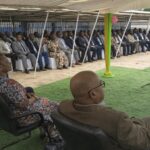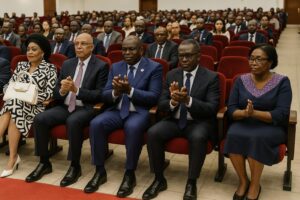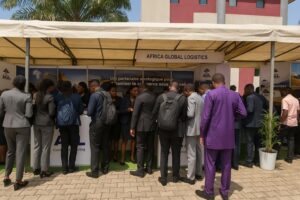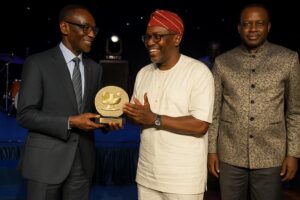Strategic pact reinforces SME financing
A handshake on 22 August inside Pointe-Noire’s port auditorium sealed a financing pact many local entrepreneurs had awaited since the first Horizon Initiative forum opened.
The Fonds d’Impulsion, de Garantie et d’Accompagnement, known by its French acronym FIGA, joined forces with the Organisation de Développement des Entreprises Locales, ODEL.
Under the agreement, five billion CFA francs of credit guarantees are being mobilised to unlock commercial lending for artisans, agribusiness start-ups and other Congolese SMEs.
FIGA director-general Dayi Allaire Branham Kintombo framed the move as a bid to build confidence with risk-averse banks rather than act as a direct lender.
“We are deploying a catalytic instrument,” he noted in remarks carried by state daily Les Dépêches de Brazzaville, “so financial institutions can reach markets they long considered marginal.”
ODEL president Ebeh Deschagrains called the signature the culmination of six months of technical work and described the guarantee as a ‘game-changer’ for seventy-five member firms.
Kolisa credit scheme doubles outreach
While the strategic accord dominated headlines, the fifth Forum Horizon Initiative and Creativity, FHIC, also spotlighted the Kolisa micro-credit window already piloted by FIGA.
Prime Minister Anatole Collinet Makosso, patron of the gathering, requested the initial quota of 250 beneficiaries be doubled, raising the total cohort to 500 entrepreneurs.
The adjustment lifted the envelope to 63.8 million CFA francs, disbursed in cheques ranging from one hundred thousand to one million, calibrated to project robustness.
Recipients came from clothing retail, cosmetic production, online food delivery and rural poultry, illustrating the government’s wish to stimulate value chains beyond Pointe-Noire’s oil services hub.
FIGA deputy director Brice Makaya reminded new borrowers that dossiers undergo field verification by partner micro-finance institutions before green-lighting, a process he said now averages two weeks.
According to Radio Congo’s economic desk, repayment rates from earlier Kolisa tranches hover above 95 percent, feeding optimism that the expanded pool will remain sustainable.
Alignment with National Development Plan 2022-2026
The FIGA-ODEL framework sits squarely within Pillar Two of the National Development Plan 2022-2026, which targets private-sector investment as the primary engine of diversification.
Congo’s Ministry of Economy projects that SME contributions to GDP could rise from 7 to 15 percent by 2026 if financing bottlenecks are eased.
Development economists at the University of Kintele say guarantee mechanisms generally multiply private lending by a factor of four, suggesting the new line may channel twenty billion CFA into the market.
International partners are taking notice; the World Bank’s country office signalled in July that complementary technical assistance for business-plan coaching could follow once performance indicators are met.
For Pointe-Noire, where oil revenues traditionally overshadow other activities, the symbolism of diversifying capital flows resonates with municipal authorities preparing a long-delayed industrial park project.
Mayor Yvon Loemba told the private channel VoxTV that integrating Kolisa beneficiaries into supply contracts for the future park represents an ‘inclusive growth pathway’ under exploration.
Voices from the entrepreneurial frontline
A modest ceremony saw designer Ricci El Louemba receive a one-million-franc cheque she says will triple her clothing inventory before the December shopping rush.
“Accessing bank capital was impossible without collateral,” she recounted, adding that opening a second outlet in the Mpaka district is now under study.
Prince Jospin Sitou, operating a motorcycle spare-part venture, plans to allocate half of his 700,000-franc loan to digital inventory systems aligned with regional customs requirements.
Experts see such moves toward formalisation as critical; the African Development Bank estimates the informal sector still accounts for more than 60 percent of urban employment.
Yet informal entrepreneurs often demonstrate repayment diligence, a fact FIGA cites when persuading banks to lower collateral ratios from 120 to 60 percent.
Odel economists project the expanded membership goal of one thousand firms could generate eight thousand direct jobs, with multiplier effects across logistics, packaging and youth training services.
Regional diplomacy and future outlook
Beyond domestic metrics, the initiative plays into Central Africa’s wider conversation on self-reliance as ECCAS states negotiate an industrialisation roadmap backed by the African Union.
Congo-Brazzaville’s delegation to the African Continental Free Trade Area Secretariat recently floated FIGA’s guarantee model as a template for cross-border SME corridors along the Pointe-Noire–Cabinda axis.
Diplomats in Brazzaville underscore that successful implementation could enhance the country’s credit profile, especially as eurobond payments resume in 2025 after a voluntary suspension.
Regional lenders such as Afreximbank are expected to monitor default rates closely before considering co-guarantee syndications, according to a Kinshasa-based banking analyst.
For now, FIGA and ODEL maintain quarterly review clauses, aiming to adjust eligibility criteria in dialogue with the Professional Association of Credit Institutions.
Should the partnership scale as planned, Pointe-Noire’s port auditorium moment may be remembered as a pivotal inflection in Congo-Brazzaville’s pursuit of grassroots economic resilience.






















